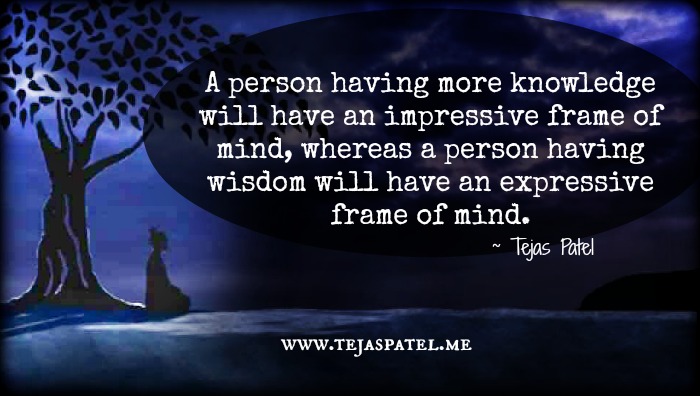A person having more knowledge will have an impressive frame of mind, whereas a person having wisdom will have an expressive frame of mind. ~ Tejas Patel
Throughout life people will make you mad, disrespect you and treat you badly. Let God deal with the things they do because hate in your heart will consume you too. ~ Wajahat Riaz
The Art of Wisdom: Unleashing the Power of Expression
In today’s fast-paced world, it’s easy to get caught up in the pursuit of knowledge. We’re constantly bombarded with information, and it’s tempting to believe that the more we know, the more impressive we’ll be. But what if we’re missing the mark? What if there’s more to being impressive than simply having a lot of knowledge? According to the quote, “A person having more knowledge will have an impressive frame of mind, whereas a person having wisdom will have an expressive frame of mind.” In this article, we’ll explore the difference between knowledge and wisdom, and why wisdom is the key to unlocking true expression.
The Distinction Between Knowledge and Wisdom
Knowledge refers to the facts and information we’ve acquired through our experiences, education, and exposure. It’s what we know about the world, and it’s often measured by our ability to recall and apply that information. On the other hand, wisdom refers to the insight and discernment that comes from reflecting on our experiences and understanding how they relate to each other. Wisdom is not just about knowing facts, but about knowing how to apply that knowledge in meaningful ways.
- Knowledge is about knowing what to do, while wisdom is about knowing what to do when things don’t go as planned.
- Knowledge is about memorizing facts, while wisdom is about understanding their significance.
- Knowledge is about being right, while wisdom is about being wise.
The Expressive Frame of Mind
When we’re driven by a desire to impress others with our knowledge, we often focus on showcasing our expertise rather than truly engaging with others. We may come across as arrogant or condescending, and our interactions can feel superficial and lacking in depth. On the other hand, when we’re driven by a desire to express ourselves wisely, we’re more likely to be authentic, empathetic, and open-minded. We’re able to connect with others on a deeper level, and our relationships become more meaningful and fulfilling.
Practical Applications of Wisdom
So how can we cultivate wisdom in our daily lives? Here are a few practical tips:
- Practice mindfulness: Take time to reflect on your experiences and emotions, and try to understand how they relate to each other.
- Seek out diverse perspectives: Engage with people from different backgrounds and cultures, and be open to learning from them.
- Practice self-reflection: Regularly take time to reflect on your own biases and assumptions, and try to challenge them.
Conclusion
In conclusion, while knowledge is important, it’s not enough on its own. Wisdom is the key to unlocking true expression and building meaningful relationships. By cultivating wisdom, we can develop an expressive frame of mind that allows us to connect with others on a deeper level. So next time you’re tempted to focus on impressing others with your knowledge, take a step back and consider how you can use your wisdom to express yourself in a more authentic and meaningful way.




